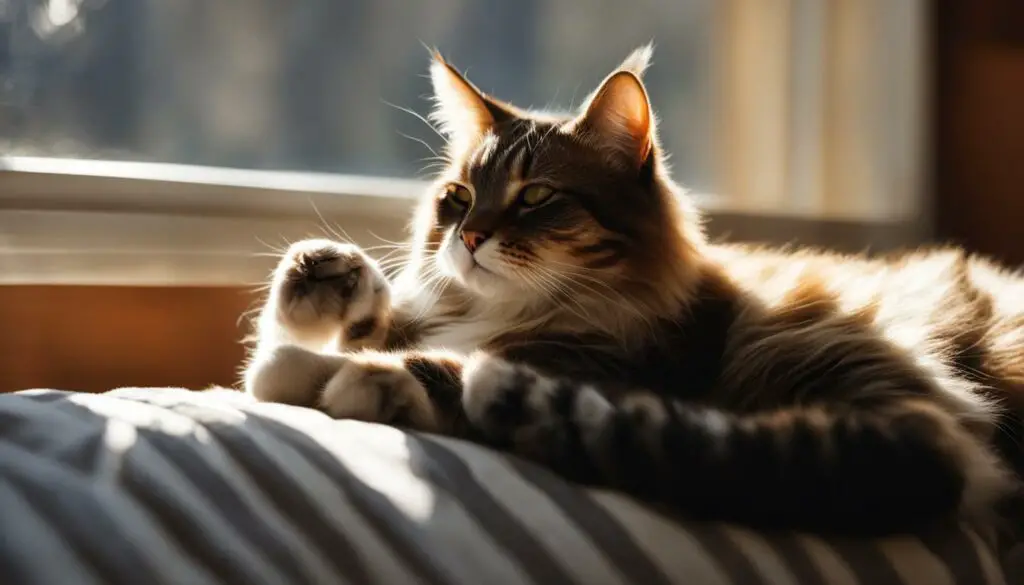Cats are fascinating creatures with unique behaviors. One such behavior that many cat owners are familiar with is morning licking. Have you ever wondered why your cat showers you with affectionate licks as soon as the sun rises? In this article, we will delve into the reasons behind your cat’s morning ritual, exploring the various factors that contribute to this bonding experience between you and your feline friend.
Key Takeaways:
- Morning licking is a common behavior in cats, serving various purposes.
- Cats may lick you in the morning to wake you up or seek affection and bonding.
- It is also a way for cats to groom themselves and mark their territory.
- Excessive licking can indicate underlying issues and should be addressed.
- Understanding your cat’s individual needs and creating a healthy morning routine can strengthen your bond.
Cats Lick to Wake You Up
One possible reason why your cat licks you in the morning is to wake you up. Cats are naturally active in the early hours due to their predatory instincts. By licking you, they are trying to get your attention and prompt you to start your day. This behavior can be attributed to their need for food and companionship in the morning.
My cat, Luna, is always licking my face in the morning. It’s like she’s saying, ‘Hey, it’s time to wake up and feed me!’ I think it’s her way of reminding me that she relies on me for her breakfast,” says Emily, a cat owner from New York City.
It’s important to note that not all cats exhibit this behavior, as each cat has its own unique personality and preferences. Some cats may choose alternative methods, such as meowing or jumping on the bed, to wake their owners up. However, if your cat is a morning licker, it’s a sign that they are eager to start their day and engage with you.
Building a Strong Morning Routine
Creating a consistent morning routine can help manage your cat’s licking behavior and enhance your bond. Start by incorporating playtime and feeding into your morning schedule. Engaging in interactive play sessions before breakfast can help release your cat’s pent-up energy and provide mental stimulation. Follow this with a nutritious meal to satisfy their hunger.
Additionally, ensuring that your cat has ample toys, scratching posts, and other forms of enrichment can help keep them occupied and prevent excessive licking. Providing a stimulating environment can redirect their focus and reduce the need for constant attention-seeking behaviors.
Table: Understanding Why Cats Lick to Wake You Up
| Reason | Explanation |
|---|---|
| Predatory Instincts | Cats are naturally active in the morning due to their instinctual hunting behavior. |
| Attention Seeking | Licking is a way for cats to get your attention and prompt you to start your day. |
| Food and Companionship | By licking you, cats are expressing their need for breakfast and interaction in the morning. |
Understanding the reasons behind your cat’s morning licking behavior can help you establish a healthy and enjoyable routine. By acknowledging their instinctual needs and providing them with the attention and care they seek, you can strengthen your bond and start your day off on the right paw.
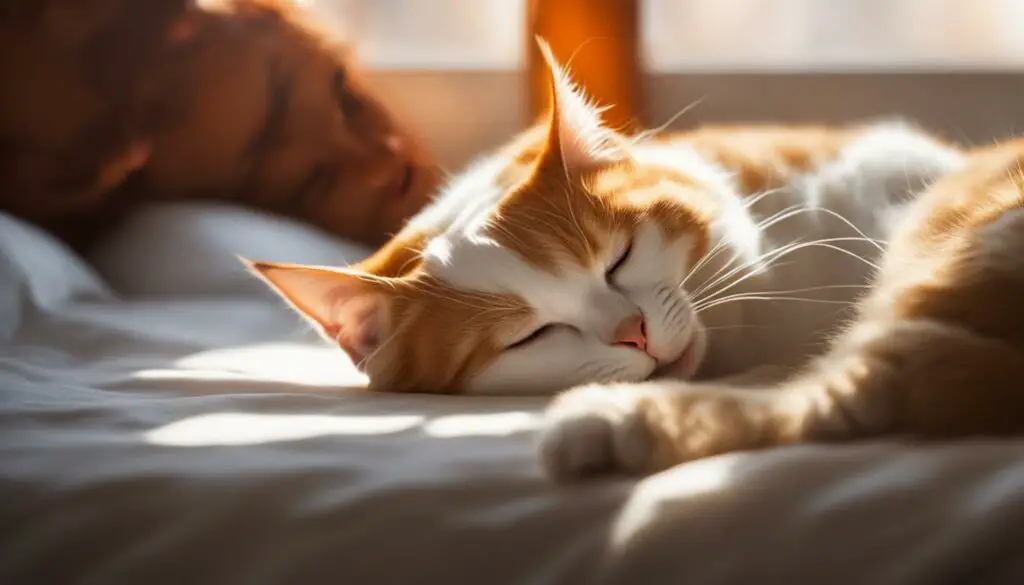
Cats Lick for Affection and Bonding
One of the main reasons why cats lick their owners in the morning is to show affection and strengthen the bond between them. Licking is a grooming behavior that cats learn from their mothers. By grooming you, they are displaying their love and care. This act of bonding helps create a sense of familiarity and trust between you and your cat, enhancing your relationship.
Cat licking in the morning is not only a physical act but also a way for cats to communicate their emotions. It is their way of saying “I love you” and expressing their affection towards you. By engaging in this behavior, they are seeking closeness and connection with their human companion.
Licking also provides cats with a sense of comfort and security. When they lick you, they are engaging in sensory stimulation, which helps them feel more relaxed. The act of licking releases endorphins, which are natural mood boosters, contributing to their overall well-being and reducing stress levels.
Cats Lick Due to Grooming Instinct
When cats lick their owners in the morning, it is not only a display of affection but also a result of their natural grooming instinct. Cats are known for their cleanliness, and this behavior stems from their instinct to groom themselves and their pack members. By licking your skin and hair, they are mimicking the grooming ritual they would typically perform on themselves or other cats.
Grooming is an essential part of a cat’s daily routine, as it helps them keep their fur clean, remove dirt and debris, and distribute natural oils. It also promotes blood circulation and provides a comforting sensation. So, when your cat licks you in the morning, it’s their way of including you in their grooming routine and showing that you are part of their social group.
“Cats licking their owners is a bonding behavior that reinforces their social connections. By grooming you, they are strengthening the bond and creating a sense of trust and familiarity,” explains Dr. Sarah James, a feline behavior specialist.
It’s important to remember that grooming behavior can vary from one cat to another. Some cats may engage in more licking compared to others, depending on their personality and individual preferences. If you find the grooming behavior excessive or uncomfortable, you can redirect their attention to a grooming brush or provide alternative methods of bonding, such as interactive play or gentle petting.
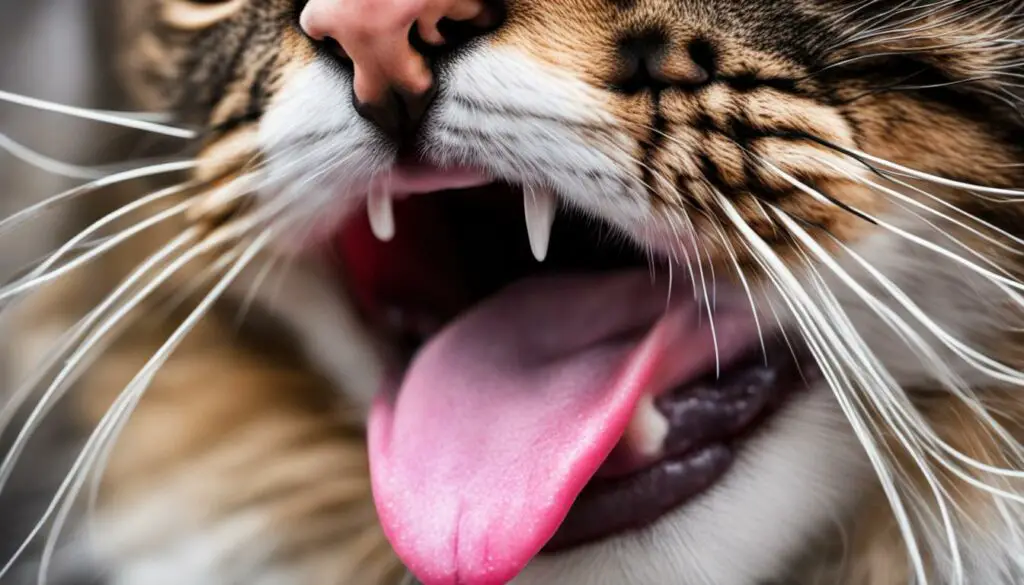
| Grooming Behavior | Explanation |
|---|---|
| Licking | Typical grooming behavior where cats use their tongues to clean their fur and remove dirt. |
| Nibbling | Light and gentle biting or nibbling behavior used to groom and clean hard-to-reach areas, such as between the toes. |
| Headbutting | A form of grooming behavior where cats rub their heads against you or other objects to deposit their scent and mark territory. |
Understanding and appreciating your cat’s grooming behavior can strengthen the bond between you and your furry friend. By reciprocating their affection and providing them with a nurturing environment, you can create a positive morning routine that promotes trust, comfort, and a deeper connection.
Cats Lick to Mark Their Territory
One of the reasons why cats lick their owners in the morning is to mark their territory. Cats have scent glands in their tongues, and by licking you, they are leaving their scent on you as a way to claim you as part of their territory. This behavior is more common in multi-cat households where cats are asserting their dominance over each other.
Licking as a territorial behavior is a way for cats to communicate their ownership and establish boundaries. By marking you with their scent, they are sending a message to other cats that you are under their protection and should not be approached or intruded upon. It’s their way of saying, “This human belongs to me.”
It’s important to note that territorial licking is different from grooming or affectionate licking. When cats lick for marking their territory, it’s often accompanied by a more assertive and persistent behavior. They may lick in specific areas, such as your face or hands, and may display signs of guarding or possessiveness. Understanding and respecting their territorial instincts can help create a peaceful coexistence in a multi-cat household.
| Signs of Territorial Licking | Signs of Affectionate Licking |
|---|---|
| Assertive and persistent licking | Gentle and rhythmic licking |
| Licking focused on specific areas | Licking throughout the body |
| Accompanied by signs of guarding or possessiveness | Accompanied by purring and relaxed body language |
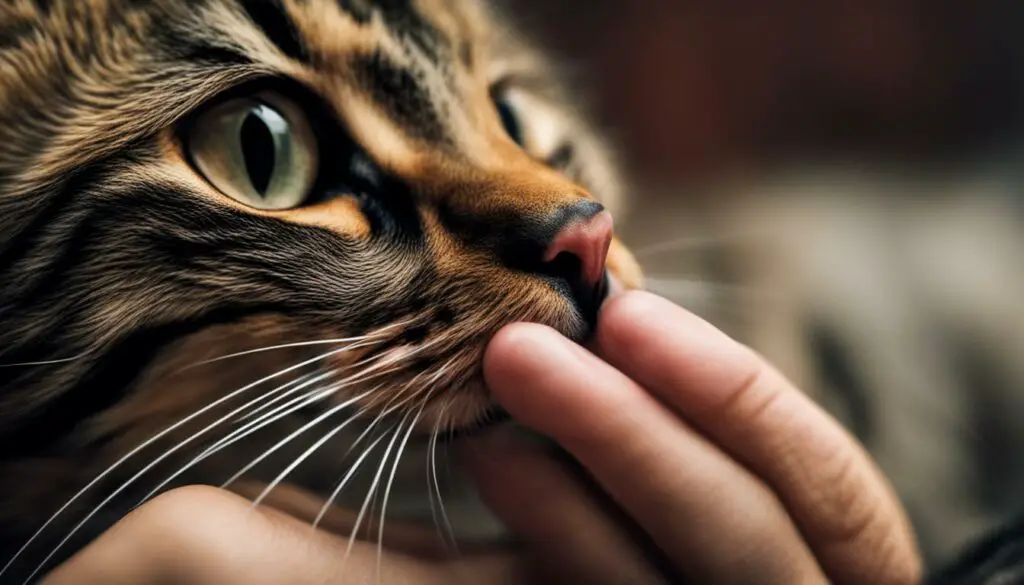
Understanding and respecting your cat’s territorial behavior is essential in maintaining a harmonious relationship. While territorial licking is a natural instinct, it’s important to ensure that it doesn’t escalate into aggressive behavior. If you notice any signs of aggression or tension, it’s advisable to consult with a veterinarian or animal behaviorist for guidance on how to address the issue and create a peaceful environment for both you and your feline companion.
Cats Lick for Sensory Stimulation
Cats have a keen sense of taste and touch, and licking provides them with a sensory experience that is comforting and reassuring. When your cat licks you in the morning, they are seeking this sensory stimulation, which helps them feel more connected to you and promotes a sense of security.
Licking also allows cats to explore their environment through taste and touch. They use their tongues to gather information about the world around them, including the scent of their surroundings and the texture of objects. By licking you, they are engaging in this natural behavior and using it as a way to interact with you.
Additionally, licking can have a calming effect on cats. The repetitive motion of their tongue against your skin or hair releases endorphins, which are natural mood boosters. This sensory stimulation helps cats relax and reduces anxiety or stress, making it a soothing activity for them.
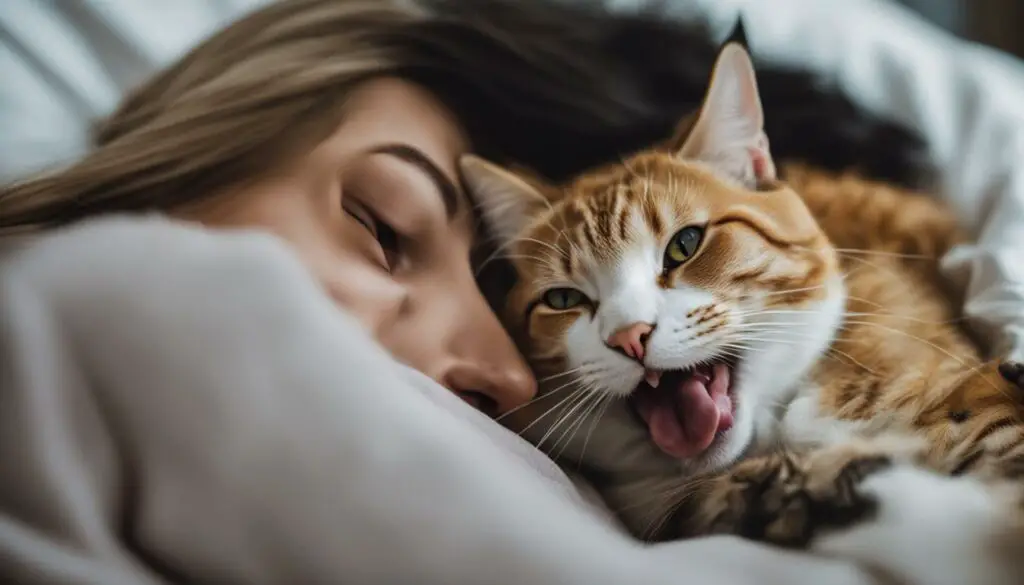
In summary, cats lick their owners in the morning for sensory stimulation. It allows them to engage their sense of taste and touch, explore their environment, and experience a comforting sensation. Understanding and appreciating this behavior can help strengthen the bond between you and your cat, as you provide them with the sensory contact they seek during your morning routine.
Cats Lick to Reduce Anxiety and Stress
If you’ve ever wondered why your cat licks you in the morning, one possible reason is to reduce anxiety and stress. Licking releases endorphins, which are natural mood boosters for cats, helping them relax and feel more at ease.
This calming behavior is especially important in the morning when cats may experience heightened levels of stress due to changes in their routines or anticipation of the day ahead. By licking you, your cat not only finds comfort but also seeks reassurance and a sense of security.
If your cat displays excessive licking behavior, it could be a sign of underlying anxiety or stress that should be addressed. It’s important to observe your cat’s overall behavior and look for any additional signs of distress, such as excessive grooming, hiding, or changes in appetite. Consulting with a veterinarian or animal behaviorist can help determine the underlying cause of your cat’s anxiety and develop an appropriate treatment plan.
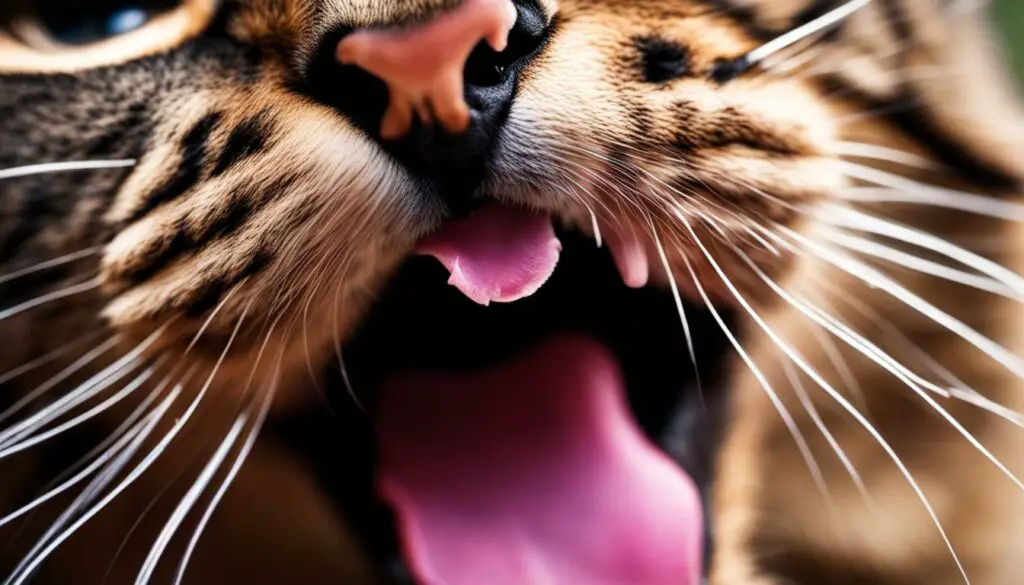
Calming Techniques for Anxious Cats
If your cat shows signs of anxiety or stress, there are several techniques you can try to help calm them:
- Provide a safe and quiet environment: Create a peaceful space for your cat where they can retreat and feel secure. This can include setting up a cozy bed, hiding spots, or a dedicated play area.
- Use pheromone sprays or diffusers: Synthetic pheromones, such as Feliway, can help create a calming atmosphere for cats. These products mimic the natural pheromones that cats release when they feel safe and secure.
- Establish a routine: Cats thrive on consistency, so establishing a regular feeding, play, and sleep schedule can help reduce anxiety. Stick to a predictable routine to provide a sense of stability and reassurance.
- Engage in interactive play: Playtime not only provides physical exercise but also mental stimulation for cats. Interactive toys that mimic prey can help redirect their energy and reduce stress.
- Consider natural supplements: Some natural supplements, such as chamomile or CBD oil, may help calm anxious cats. However, it’s important to consult with your veterinarian before introducing any new supplements or medications.
By implementing these techniques and providing a soothing environment, you can help reduce your cat’s anxiety and promote a sense of calmness in their morning routine. Remember, each cat is unique, so it may take some trial and error to find the best strategies that work for your feline companion.
| Signs of Anxiety | Signs of Stress |
|---|---|
| Excessive licking or grooming | Increased vocalization |
| Increased hiding or withdrawal | Loss of appetite |
| Aggression or destructive behavior | Changes in litter box habits |
| Excessive shedding | Restlessness or pacing |
Cats Lick Due to Hunger or Thirst
One of the reasons why cats lick their owners in the morning is to communicate their hunger or thirst. Just like humans, cats have a routine, and if they are accustomed to being fed in the morning, they may lick you as a gentle reminder. It’s their way of letting you know that it’s time to fulfill their basic needs.
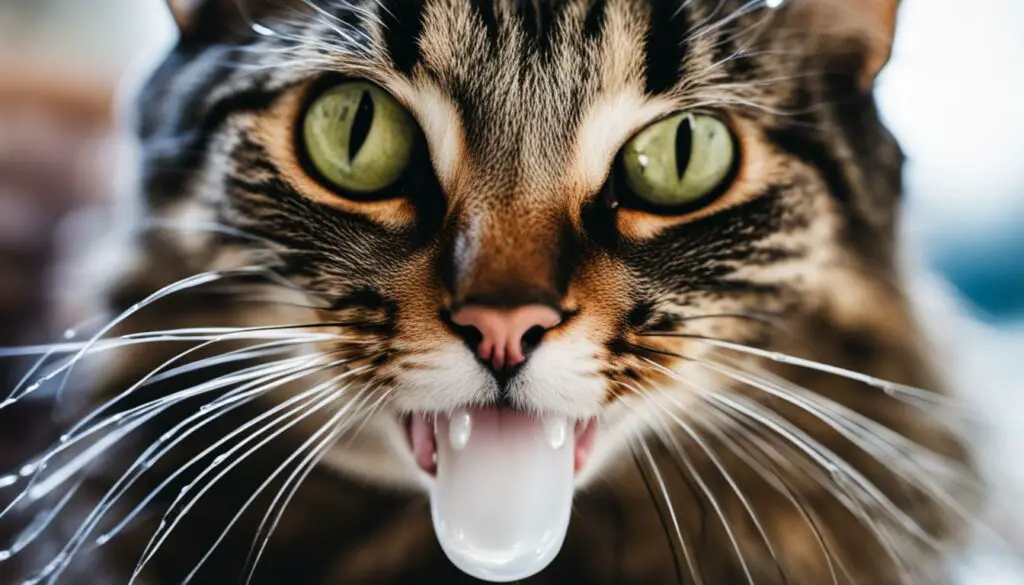
By responding to your cat’s licking behavior, you can establish a consistent feeding schedule that aligns with their natural instincts. This not only helps keep them satisfied but also strengthens the bond between you and your feline companion. Regular meals provide a sense of security and routine that cats crave, helping to create a harmonious morning experience for both of you.
It’s important to note that cats have small stomachs, so they rely on frequent, small meals throughout the day. Consider dividing their meals into multiple servings to cater to their natural feeding behavior. Additionally, make sure your cat has access to fresh water at all times to keep them hydrated and healthy.
Table: Feeding Schedule Guidelines
| Age | Number of Meals per Day | Recommended Portion Size per Meal |
|---|---|---|
| Kittens (up to 6 months) | 4-6 | 1/4 – 1/3 cup per meal |
| Adult Cats (6 months and older) | 2 | 1/4 – 1/3 cup per meal |
| Senior Cats (7 years and older) | 2 | 1/4 – 1/3 cup per meal |
These guidelines can vary depending on the size, age, and activity level of your cat. It’s essential to consult with your veterinarian to determine the appropriate feeding schedule and portion sizes for your specific furry friend. Remember, a well-fed and content cat is a happy and healthy companion.
Cats Lick for Maternal Instincts
One of the reasons why cats lick their owners in the morning is due to their maternal instincts. Just like a mother cat grooms her kittens, some cats may exhibit nurturing behavior towards their owners by licking them. This behavior is more commonly seen in female cats, as they have a natural inclination to care for and protect their young.
Licking their owners in the morning is a way for these cats to show affection and treat their owners as their own “kittens.” It’s a gentle, nurturing act that demonstrates their love and protective nature. While not all cats display this behavior, those who do are expressing their maternal instincts and a deep bond with their owners.
This behavior is endearing and can be seen as a special form of communication between the cat and their owner. It strengthens the bond between them and serves as a reminder of the unique connection they share. When your cat licks you in the morning, it is a sign of trust, love, and their desire to care for you.
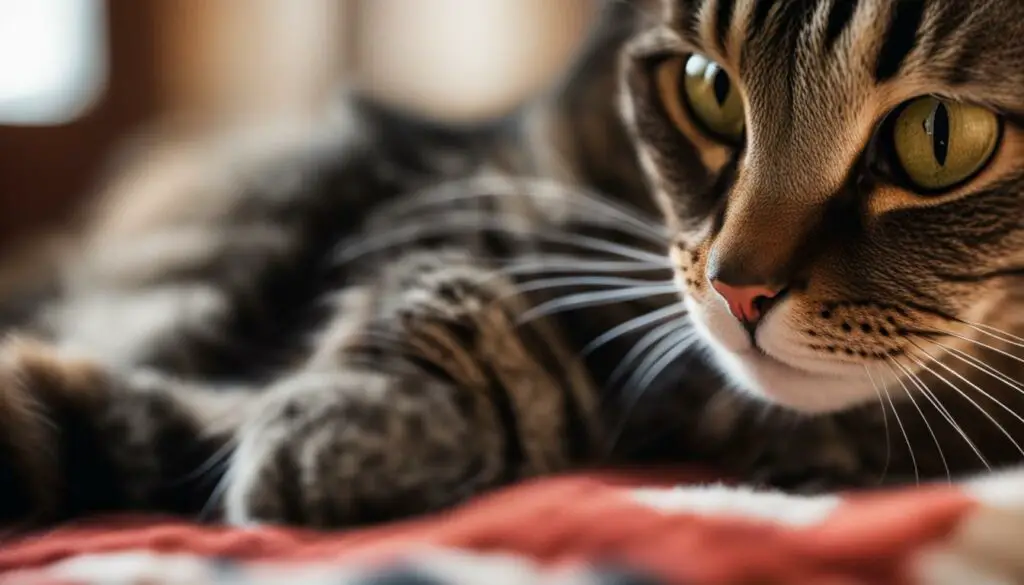
Understanding Maternal Instincts
Maternal instincts are deeply ingrained in female cats. Even if they haven’t given birth to their own kittens, they may still exhibit nurturing behavior towards other cats or even their human companions. It’s important to recognize and appreciate these instincts, as they play a significant role in strengthening the bond between cats and their owners.
Creating a Nurturing Environment
To encourage and support your cat’s maternal instincts, create a nurturing environment. Provide them with a cozy and comfortable space where they can relax and feel safe. Offer plenty of toys, scratching posts, and hiding spots to stimulate their natural behaviors. Additionally, spend quality time with your cat, engaging in gentle play and bonding activities to further enhance the maternal bond between you.
Addressing Excessive Licking Behavior
If your cat’s licking behavior becomes excessive, it may be a sign of underlying behavioral issues or health concerns that need to be addressed. Excessive licking can lead to hair loss, skin irritation, and even self-inflicted wounds. It’s important to take action to ensure the well-being of your feline friend. Here are some steps you can take to address excessive licking behavior:
- Consult with a veterinarian: Schedule a visit with your veterinarian to rule out any underlying medical conditions that may be causing the excessive licking. They can perform a thorough examination and recommend appropriate tests or treatments.
- Identify triggers and stressors: Observe your cat’s behavior and try to identify any triggers or stressors that may be causing the excessive licking. It could be changes in the environment, conflicts with other pets, or separation anxiety. Once identified, you can work on minimizing or managing these triggers.
- Provide environmental enrichment: Ensure that your cat’s environment is enriched with toys, scratching posts, and hiding spots. This will help keep them mentally stimulated and reduce boredom or anxiety that may contribute to excessive licking.
- Redirect their behavior: When you notice your cat engaging in excessive licking, gently redirect their attention to a more appropriate behavior, such as interactive play or providing them with a puzzle feeder. This will help distract them from the licking and provide a healthier outlet for their energy.
- Consider behavior modification techniques: In some cases, behavior modification techniques, such as desensitization or counterconditioning, may be necessary. These techniques involve gradually exposing your cat to the triggers or stressors in a controlled manner, helping them learn to associate those situations with positive experiences.
Remember, addressing excessive licking behavior may require time and patience. It’s important to be consistent in your approach and provide a calm and supportive environment for your cat. If you’re unsure how to proceed or if the behavior persists, consult with an animal behaviorist who can provide further guidance and support.
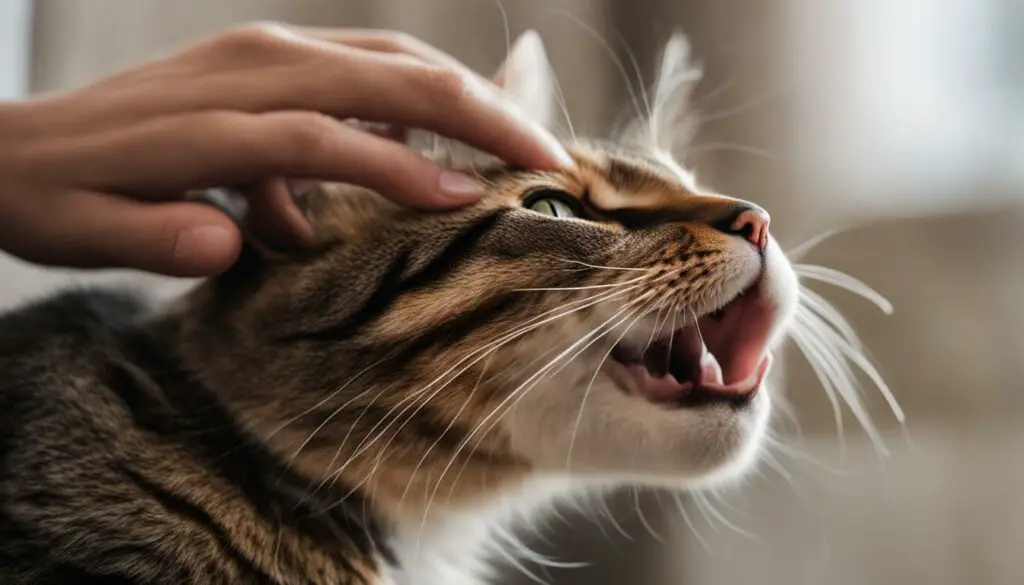
Promoting Healthy Morning Routines
In order to promote a healthy morning routine with your cat, it is important to incorporate bonding activities into your daily schedule. Engaging in interactive play sessions not only stimulates your cat physically and mentally, but also strengthens the bond between you and your feline friend. Consider using interactive toys such as feather wands or puzzle feeders to keep your cat entertained and mentally stimulated in the morning.
Additionally, providing environmental enrichment is crucial for your cat’s overall well-being. This can include setting up scratching posts, providing hiding spots, or even creating a window perch where your cat can observe the outdoors. Creating a stimulating environment helps prevent boredom and allows your cat to engage in natural behaviors.
Establishing a consistent feeding schedule is also important for your cat’s morning routine. Cats thrive on routine, so feeding them at the same time each morning helps regulate their hunger and provides a sense of security. Be sure to provide fresh water as well, as hydration is essential for your cat’s health.
By meeting your cat’s physical and mental needs through bonding activities, environmental enrichment, and a consistent feeding schedule, you can create a positive and fulfilling morning experience for both you and your furry companion.
Table: Examples of Bonding Activities for Cats
| Bonding Activity | Description |
|---|---|
| Interactive Play | Engage in play sessions using interactive toys such as feather wands or laser pointers. |
| Grooming and Brushing | Regularly groom your cat by brushing their fur or using grooming wipes for a bonding experience. |
| Treat Time | Use treats to reward your cat’s good behavior and create a positive association with you. |
| Quiet Quality Time | Spend calm moments together, such as reading a book or watching TV, to provide a sense of security and companionship. |
Remember, every cat is unique, so it’s important to observe and understand your cat’s preferences. Tailor your bonding activities to suit their individual needs, ensuring a positive and enjoyable morning routine for both of you.
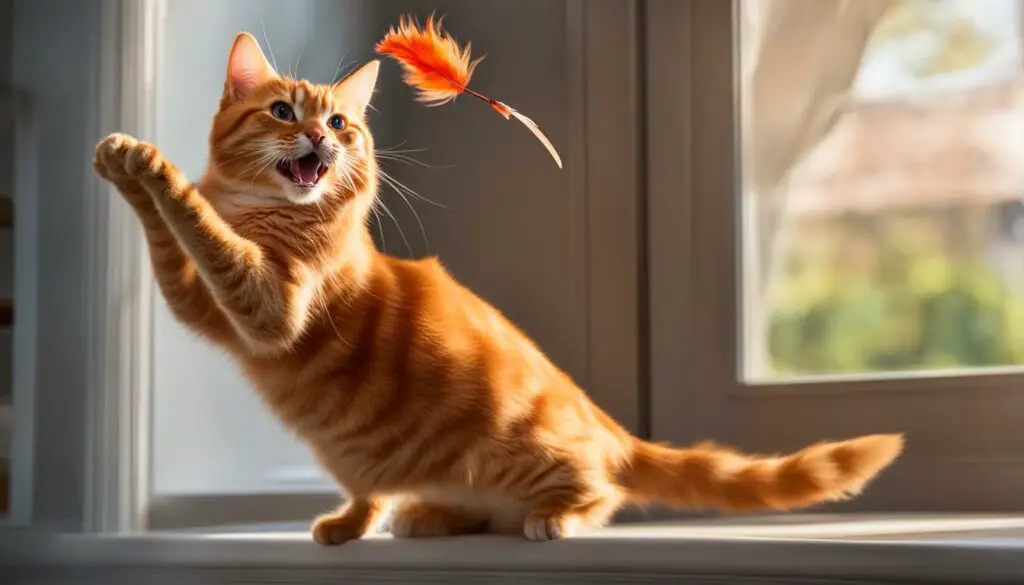
Understanding Your Cat’s Individual Needs
When it comes to cats and their morning routines, it’s essential to recognize that each feline has unique individual needs and preferences. By taking the time to observe and understand your cat’s behavior, you can provide personalized care that promotes their well-being and strengthens your bond.
One aspect of understanding your cat’s individual needs is recognizing their specific behavior patterns in the morning. Does your cat prefer a quiet, calm start to the day, or do they enjoy interactive play sessions to get their energy flowing? By tailoring your morning routine to match your cat’s preferences, you can ensure a positive start to their day.
Additionally, providing personalized care involves meeting your cat’s physical and mental needs in the morning. This could include activities such as grooming, feeding, and engaging in interactive play. By addressing these specific needs, you can create a harmonious morning routine that caters to your cat’s overall well-being.
Remember, your cat relies on you to understand and attend to their unique needs. By offering personalized care and attention, you can create a morning routine that not only meets their individual requirements but also strengthens the bond between you and your feline companion.
Table: Understanding Your Cat’s Individual Needs
| Individual Needs | Implications |
|---|---|
| Quiet Start | Provide a calm and peaceful environment in the morning. |
| Interactive Play | Incorporate play sessions to stimulate their energy and mental agility. |
| Grooming | Offer regular grooming sessions to maintain their hygiene and bond. |
| Feeding | Establish a consistent feeding schedule to meet their nutritional needs. |
| Environmental Enrichment | Provide engaging toys and stimuli to keep them mentally stimulated. |
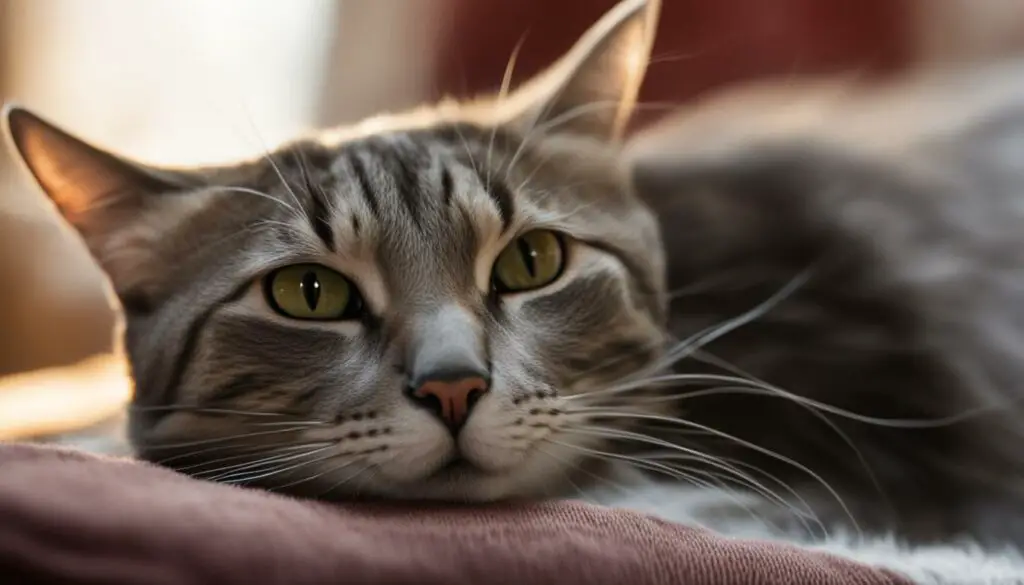
Understanding your cat’s individual needs requires attentive observation and a willingness to adapt. By demonstrating a deep understanding and fulfilling their unique requirements, you can create a morning routine that sets the stage for a harmonious and fulfilling day for both you and your cat.
Enhancing Communication with Your Cat
Understanding your cat’s body language and behavior can greatly improve your communication with them. Cats have a unique way of expressing themselves, and by paying attention to their cues, you can build a stronger bond and deepen your connection. Here are some tips to enhance communication with your cat during your morning routine:
1. Observe Their Tail
A cat’s tail can convey a lot of information about their mood and intentions. A relaxed, gently swaying tail usually indicates that your cat is content and comfortable. On the other hand, a puffed-up tail or one that is twitching vigorously might indicate that your cat is feeling agitated or anxious. Take note of your cat’s tail movements during your morning interactions to better understand their emotions.
2. Pay Attention to Their Purring
Purring is one of the most well-known forms of communication for cats. It can signify contentment, relaxation, or even a desire for attention. If your cat purrs while licking you in the morning, it’s likely a sign of affection and bonding. Respond positively to their purring by petting them gently or engaging in interactive play. This will reinforce the positive communication and strengthen your relationship.
3. Respect Their Personal Space
While cats can be affectionate, they also value their personal space. If your cat seems aloof or tries to retreat during your morning routine, respect their boundaries and give them some alone time. Forcing interactions may lead to stress or discomfort for your cat. Instead, provide them with a safe and cozy space where they can relax until they are ready to engage with you.
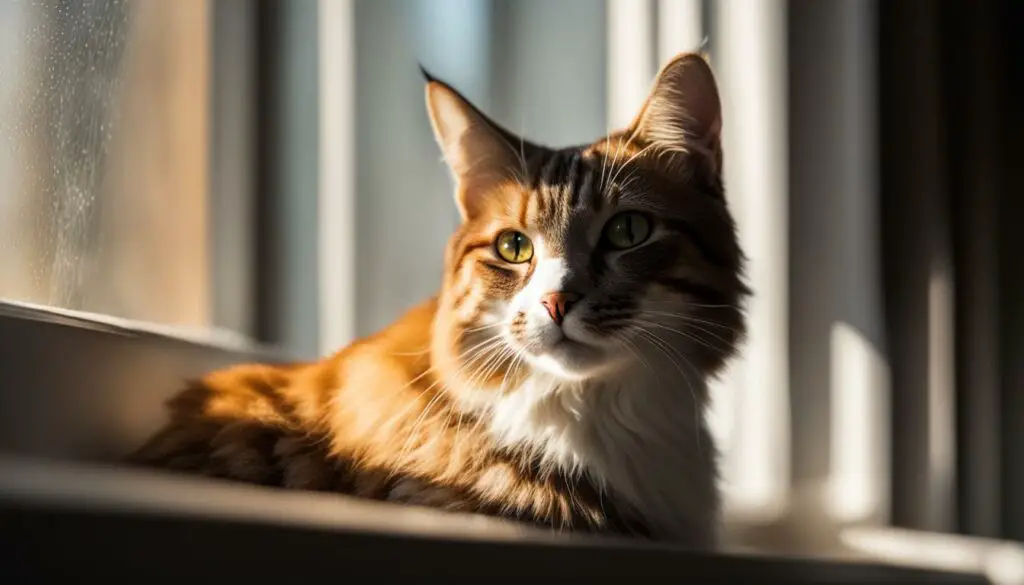
Remember that each cat is unique, and their communication styles may vary. Take the time to observe and understand your cat’s behavior during your morning routine. By being attentive and responsive to their needs, you can establish a deeper level of communication, fostering a stronger bond and a more enriching morning experience.
Building Trust and Comfort
When it comes to building a strong bond with your cat, trust and comfort are essential. By creating an environment where your cat feels safe and secure, you can establish a foundation of trust that strengthens your relationship. Understanding your cat’s behavior and needs in the morning routine is key to achieving this.
One way to build trust is by providing consistent care and meeting your cat’s needs in the morning. This includes ensuring they have access to food and water, a clean litter box, and a comfortable sleeping area. By meeting these basic needs, you show your cat that they can rely on you and feel secure in their environment.
Additionally, providing affection and positive reinforcement can help your cat feel more comfortable and build trust. Take the time to engage in gentle play sessions, offer treats or praise, and give them space when they need it. This helps create a positive association with you and fosters a sense of security and trust.
Creating a Safe and Nurturing Environment
Creating a safe and nurturing environment is another important aspect of building trust and comfort. Cats thrive in an environment that is predictable and free from stressors. Ensuring your cat has a designated space where they can retreat and relax, away from noise or other pets, can help them feel safe and secure.
Providing environmental enrichment, such as scratching posts, toys, and vertical spaces, helps stimulate your cat’s natural behaviors and provides mental and physical stimulation. This can help alleviate stress and anxiety, promoting a sense of comfort and trust.
Lastly, maintaining a consistent morning routine is key to building trust and comfort. Cats are creatures of habit and thrive on routine. By sticking to a regular schedule for feeding, play, and interaction, you create a sense of predictability and security for your cat. This consistency reinforces trust and helps them feel more at ease in their daily routine.
| Building Trust and Comfort with Your Cat | Key Points |
|---|---|
| Consistent Care | Meeting your cat’s basic needs and providing consistent care helps build trust. |
| Affection and Positive Reinforcement | Show your cat love and reward good behavior to foster trust and comfort. |
| Safe and Nurturing Environment | Create a stress-free environment and provide enrichment to promote comfort and trust. |
| Consistent Morning Routine | Stick to a regular schedule to create a sense of security and predictability for your cat. |
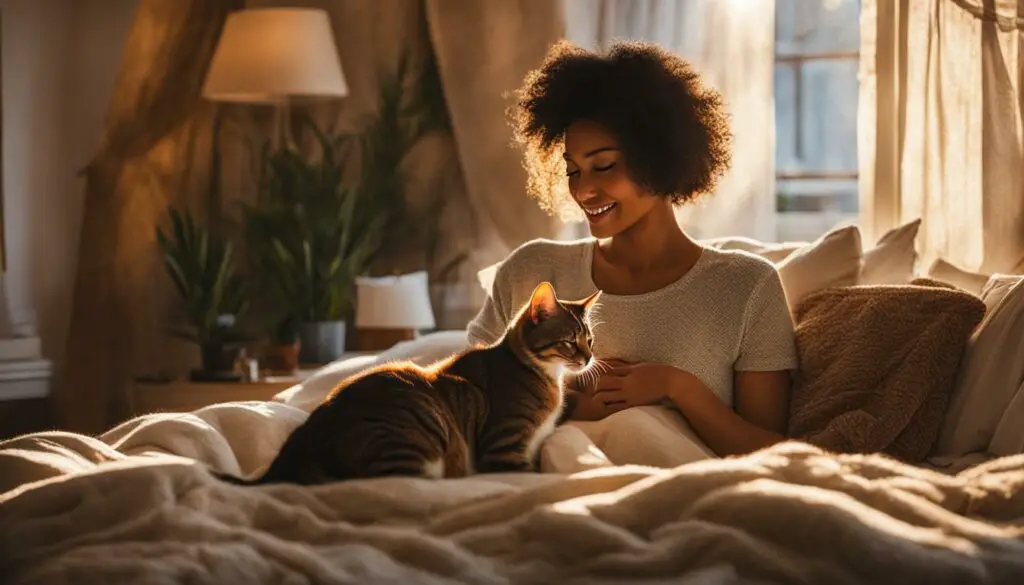
“Creating a safe and nurturing environment is crucial in building trust. By providing consistent care, affection, and a stress-free environment, cats can feel secure and comfortable, deepening their bond with their owners.”
The Joy of Morning Licks
As a cat owner, there’s something undeniably heartwarming about waking up to the gentle sensation of your feline friend’s tongue affectionately grooming you. The joy of morning licks goes beyond just a simple wake-up call; it’s a daily reminder of the deep bond and affection your cat feels for you.
These morning licks serve as a unique form of communication, expressing your cat’s love and trust. By grooming you, they are not only showing their affection but also reinforcing the bond that you share. It’s a mutual exchange of care and comfort that strengthens the connection between you and your feline companion.
“Morning licks are a testament to the love and affection your cat has for you.” – Anne, Cat Owner
Aside from the emotional significance, morning licks also contribute to your cat’s own sense of well-being. The act of grooming provides them with sensory stimulation, comfort, and reassurance. It’s a calming behavior that helps reduce their anxiety and stress levels, creating a positive start to the day for both of you.
The joy of morning licks is a unique and cherished experience for cat owners. It’s a daily reminder of the love, trust, and companionship that exists between you and your feline friend. So next time your cat wakes you up with a gentle lick, embrace it as a treasured moment that deepens your bond and brings joy to your morning routine.
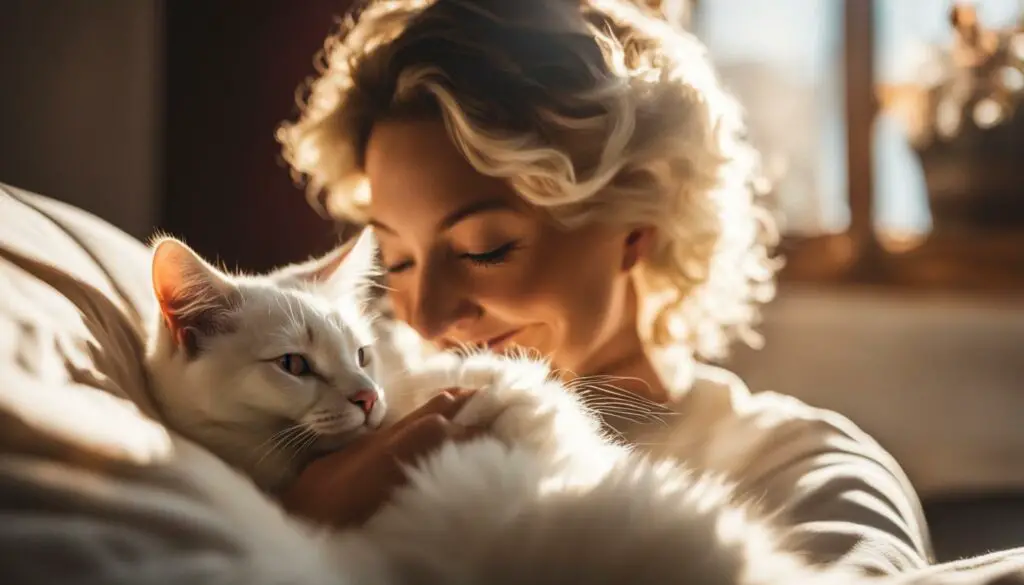
Table: The Benefits of Morning Licks
| Benefits | Description |
|---|---|
| Expresses affection | Morning licks are a way for your cat to show their love and care for you. |
| Strengthens bond | By grooming you, your cat reinforces the bond and trust between you both. |
| Provides sensory stimulation | Grooming provides cats with comfort and reassurance, reducing anxiety and stress levels. |
| Promotes overall well-being | The act of grooming contributes to your cat’s well-being, creating a positive start to the day. |
Conclusion
In conclusion, understanding why your cat licks you in the morning can shed light on their behavior and strengthen your bond. Cats lick in the morning to wake you up, show affection, engage in grooming instincts, mark their territory, seek sensory stimulation, reduce anxiety, communicate hunger or thirst, and exhibit maternal instincts. By recognizing and responding to your cat’s individual needs, you can promote a healthy morning routine and enhance your communication with them.
Building trust and comfort is essential in fostering a positive morning experience. By meeting their physical and mental needs through interactive play, environmental enrichment, and a consistent feeding schedule, you can create a safe and nurturing environment. Additionally, paying attention to your cat’s body language and responding accordingly will deepen your understanding and strengthen your bond.
Embrace the joy of morning licks as a cherished bonding experience and a symbol of the love and trust you share with your feline companion. By providing personalized care, you can ensure a harmonious morning routine and enjoy the unique connection you have with your cat. So, next time your cat licks you in the morning, appreciate it as a loving gesture and a sign of affection between you and your furry friend.
FAQ
Why does my cat lick me in the morning?
Cats may lick their owners in the morning to wake them up, show affection, groom themselves, mark their territory, engage their senses, reduce anxiety, signal hunger or thirst, or display maternal instincts.
How does cat licking contribute to bonding?
Cat licking in the morning is a bonding behavior that helps strengthen the bond between cats and their owners. It creates a sense of familiarity, trust, and affection between them.
Is cat licking a grooming behavior?
Yes, cat licking is a grooming behavior that cats learn from their mothers. By grooming their owners, cats show love and care, similar to how they groom themselves or other members of their pack.
Why do cats lick to mark their territory?
Cats have scent glands in their tongues, so when they lick their owners, they are leaving their scent as a way of claiming them as part of their territory, especially in multi-cat households.
Is cat licking a way for cats to seek sensory stimulation?
Yes, when cats lick their owners in the morning, they seek sensory stimulation. The act of licking provides them with comfort and reassurance, making them feel connected and secure.
Can excessive licking be a sign of anxiety or stress?
Yes, excessive licking can be a sign of underlying anxiety or stress in cats. If this behavior becomes obsessive or causes harm, it’s important to seek professional advice from a veterinarian or animal behaviorist.
Why do cats lick their owners to signal hunger or thirst?
If cats are accustomed to being fed in the morning, they may lick their owners as a reminder to fulfill their basic needs. Having a consistent feeding schedule can help minimize this behavior.
Do cats lick their owners out of maternal instinct?
Some cats may lick their owners in the morning as a nurturing behavior, treating them as their own young. This behavior is more commonly seen in female cats and can be a sign of their affection and protective nature.
What should I do if my cat’s licking behavior is excessive?
If your cat’s licking becomes excessive or problematic, it’s important to consult with a veterinarian or animal behaviorist to determine the underlying cause and develop a treatment plan.
How can I promote a healthy morning routine with my cat?
To promote a healthy morning routine, you can incorporate bonding activities, interactive play sessions, environmental enrichment, and establish a consistent feeding schedule.
Why is it important to understand my cat’s individual needs?
Every cat is unique and has individual needs and preferences. By taking the time to understand your cat’s behavior and catering to their specific needs, you can strengthen the bond and create a harmonious morning routine.
How can I enhance communication with my cat?
By understanding your cat’s body language and behavior, you can enhance communication. Pay attention to their cues and respond accordingly, whether it’s reciprocating affection or redirecting attention.
How can I build trust and comfort with my cat?
Daily interactions in the morning play a crucial role in building trust and comfort between you and your cat. By consistently meeting their needs, providing affection, and creating a safe environment, you can establish a foundation of trust.
Should I embrace my cat’s morning licks as a bonding experience?
Absolutely! Despite the occasional annoyance, being licked by your cat in the morning is a testament to their love and affection. Embrace these morning licks as a cherished bonding experience and a symbol of the unique connection you share.
What can I do to bond with my cat during morning routines?
Bonding with your cat during morning routines can be achieved by providing personalized attention, meeting their needs, engaging in activities they enjoy, and creating a positive and fulfilling environment for both of you.
Why is understanding my cat’s behavior important for our morning routine?
Understanding your cat’s behavior in the morning allows you to tailor your care accordingly, meeting their specific needs and preferences. This understanding fosters a deeper bond and creates a harmonious morning routine.
Source Links
- https://purrfectnpawesome.com/why-does-my-cat-lick-me-in-the-morning/
- https://www.purina.co.uk/articles/cats/behaviour/understanding-cats/why-does-my-cat-lick-me
- https://kittycattips.com/why-does-my-cat-lick-my-face-in-the-morning/

